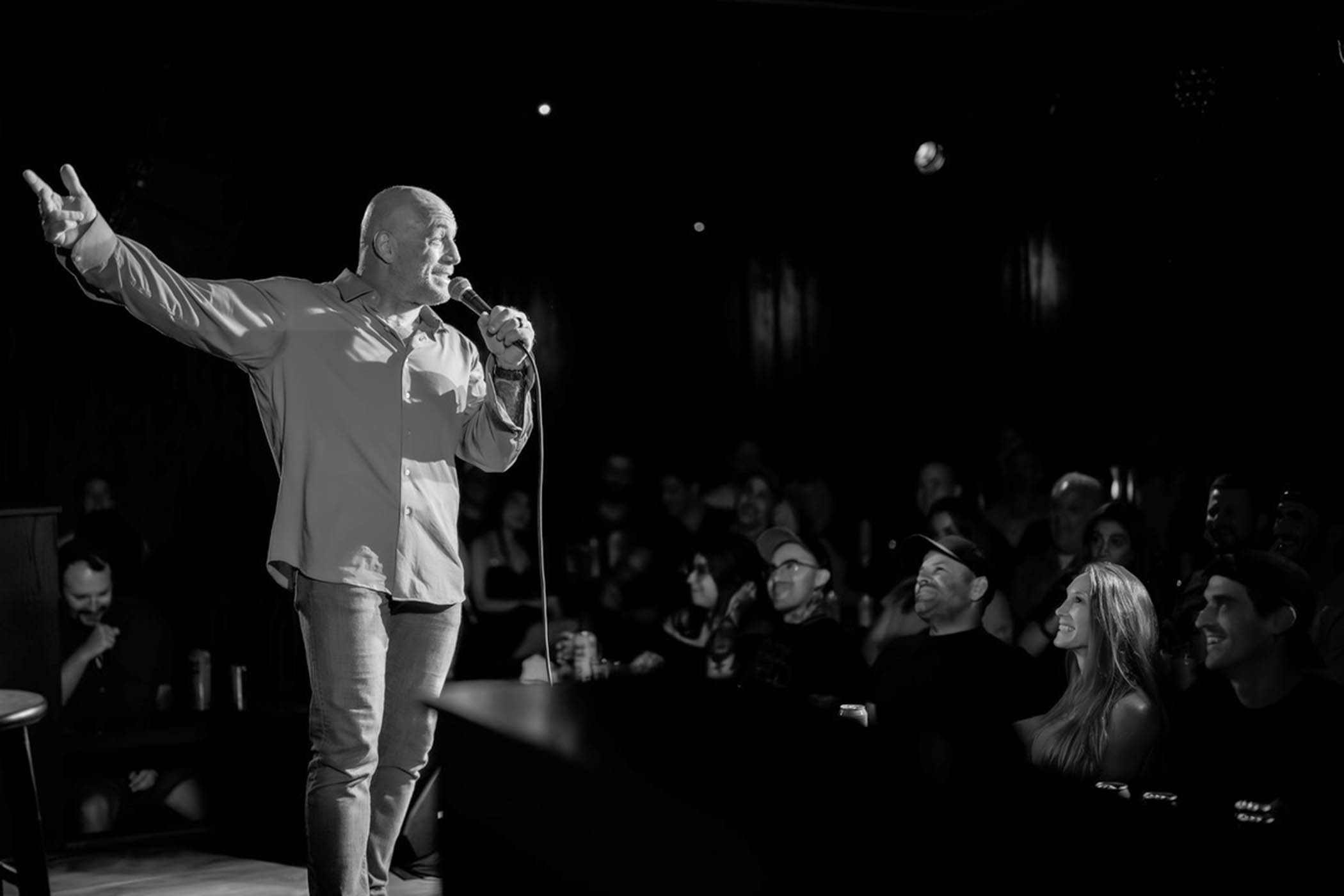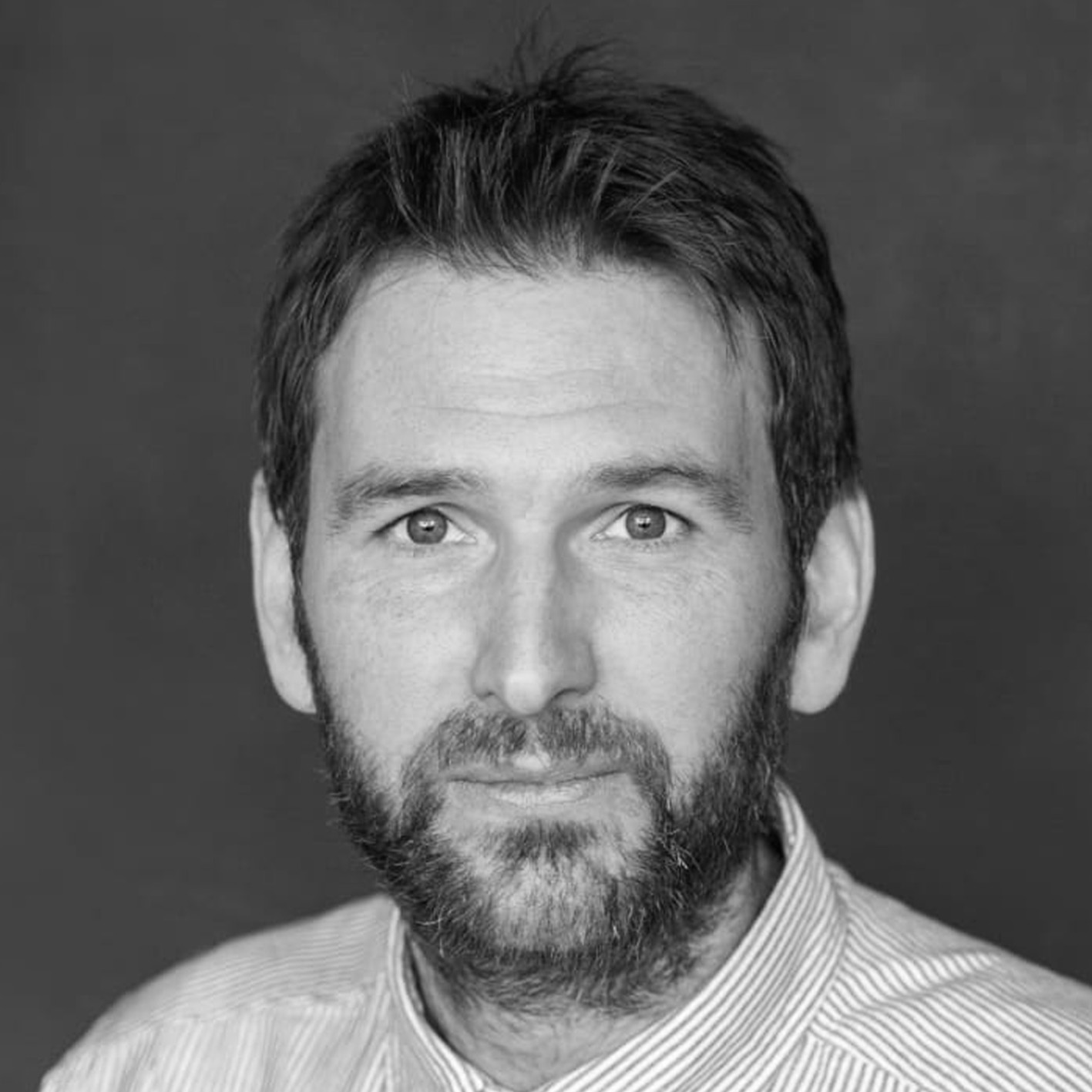I should hold my nose while writing this. Distance myself from those I’m writing about. List the bad things they’ve said or done. Signal my progressive leanings. But it’s not like that. I love the world I’m writing about. The question is: can I be honest about it?
Imagine this. You’re a 45-year-old wash-up in a country that’s nice enough, but all the signs are it’s done; broke, insignificant, repressive – and you can’t see a future for your kids here. Then you fly across the Atlantic to a place with sunshine and robot taxis. You check in to your hotel, drink a paper plane in the rooftop bar and look at the skyline of cranes. This is Austin, not New York; it’s not even the biggest city in Texas, but it makes your home city, Newcastle, feel tiny and left behind. The future’s here.
You walk to 6th Street, a fun, slightly wild part of town where the bars don’t sell food (it gets in the way of drinking, a bouncer says) and the comedian Joe Rogan’s turned an old theatre into the most talked-about comedy club in the world: Comedy Mothership. They put a wristband on you that says “Fat Man” (the name of the club’s main room, and accurate), then, under a sign flanked by aliens – one of Rogan’s favourite subjects – they check your pockets and put your phone in a locked pouch. No material loss.
Have a drink in Mitzi’s, named after Mitzi Shore, former owner of the Comedy Store in Los Angeles, who died in 2018. “Her mission was to provide a space where comics could feel safe to take risks,” the menu says. Cocktails include a rear naked choke.
Into Fat Man. It seats 250 people and a ticket costs $40. All the weekend’s shows are sold out. You scribble notes on receipts: “mixed crowd”, “women in dresses”, “cowboy boots”, “‘Taxation is theft’ T-shirt”, “family talking about [US writer] Coleman Hughes”.
This is how it works: a headliner flies in to do two shows on Friday, two on Saturday and one on Sunday. Three local comedians will go on first at each show. They’re all men this weekend. That doesn’t matter here, and perhaps not anywhere any more. CJ Landry goes on first. Then Kurt Metzger, an established comic who won an Emmy for writing on Amy Schumer’s show, who does a joke about wanking in a robot taxi. Then Tim Butterly, who says his job is “making podcasts for retarded fellas”.
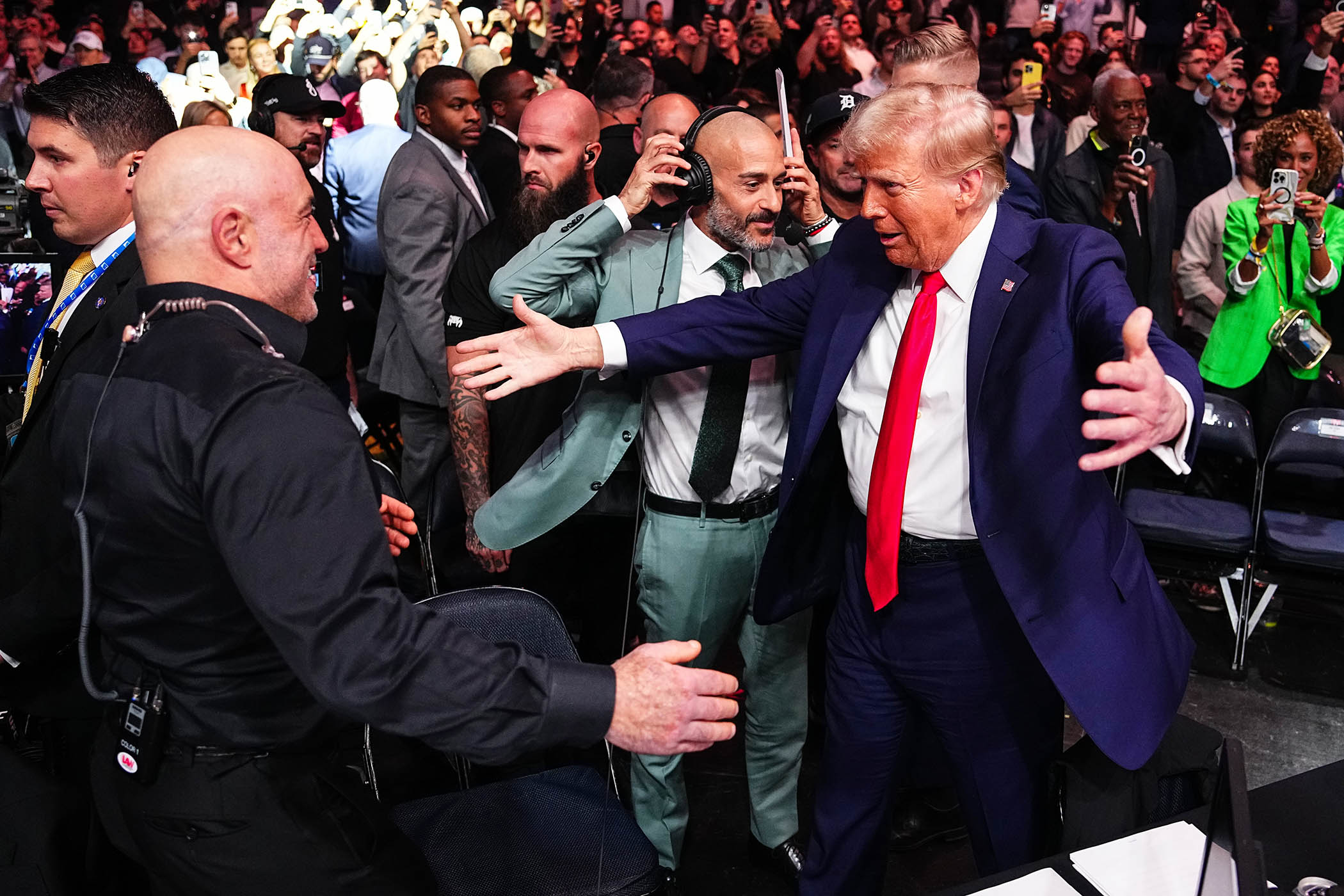
Joe Rogan greets president-elect Donald Trump at New York’s Madison Square Garden in November 2024
You laugh, the crowd laughs, but that’s not why you’re here. You’re here because you’ve been writing about American standup for 15 years (including a book), but in the last year, it changed: a shift from commentary to something else.
Dave Smith is the weekend’s headliner. His first joke illustrates that shift. It’s about the event that made him famous this year: debating Gaza with the Spectator columnist Douglas Murray on Rogan’s podcast. (Murray was sneery: “Dave is a comedian, but he’s now mainly talking about Israel.”) The episode has been watched 4.8 million times on YouTube and propagated countless articles, social media posts and podcast episodes debating whether Smith or Murray won. “He put Douglas Murray in the ground,” said a man in Mitzi’s.
“I had a good year,” Smith tells the audience. He says he owes it all to Rogan. On Lex Fridman’s podcast in April, Smith said: “The first time Rogan had me on his podcast was, I believe, in 2016 and I might have had like 5,000 followers.” Now he has more than 800,000 on X alone.
A self-described “radical libertarian”, Smith did a Charlie Kirk Turning Point event in July, and is regularly on Piers Morgan Uncensored: “He’s one of my favourite repeat guests,” Morgan tweeted in June. “Smart, funny and interesting.”
The standup’s fans agree. “Dave Smith for president,” shouts the man next to you, who’s drunk but also means it. Many feel the same, and though it’s unlikely a comedian could become a president (raised-eyebrows emoji), twice last year Smith’s proximity to power startled you.
The first was in February, when Robert F Kennedy Jr was running for president and on Smith’s podcast asked: “Would you consider the vice-presidency?” It wasn’t clear how serious he was (Smith didn’t reply to an emailed query) and RFK dropped out to join Donald Trump’s cabinet instead.
Then, four days after Trump won, Smith tweeted: “The ‘stop [Mike] Pompeo’ movement is great but it’s not enough. Right now we need maximum pressure to keep all neocons and war hawks out of the Trump administration … America First: screw the war machine!” Donald Trump Jr replied: “Agreed 100% 100% 100%!!! I’m on it.”
So as the man shouts “Dave Smith for president” (until security ask him to stop) in a club owned by a man who helped the president get elected, you’re thinking: how did the comedians get all this power? And what are they going to do with it?
“Every comic owes O&A [Opie and Anthony] a debt of gratitude. All of us do. Without them, I don’t think there would be podcasts”
Joe Rogan on his podcast, 2025
When I first visited the US, I still thought I could be a great writer. The euphoria of Manhattan’s skyline. Ambition rumbling under avenues. All that shite. I was serious and tried to quarantine myself from the unserious, so when I saw a billboard with three shock-jocks on it – Gregg “Opie” Hughes, Anthony Cumia and Jim Norton – I thought: yuck.
That was 2008. A year later, I read an article by the standup comedian Louis CK. He was funny, so I watched clips of him on a show called Opie & Anthony, hosted by Hughes, Cumia and Norton, a comedian. They made British DJs sound phoney, like tour guides at a Potemkin village; a fake place absent of human flaws.
Things such as Norton talking about his trans fetish. They didn’t talk about that on the BBC. (He’s now married to a trans woman.) Or an experiment to see if taxi drivers would pick up black comedian Patrice O’Neal or Cumia in a Nazi helmet. Or Louis CK pressuring former US defence secretary Donald Rumsfeld to answer his question: “Are you a lizard?”
The show was a gateway to New York’s comedians and their podcasts, which led me to Legion of Skanks, co-hosted by Smith. It’s a show I could never recommend to anyone, because it’s rough, but it’s the only podcast I’ve listened to for more than a decade, because it’s funny, and because it’s been a respite from the atmosphere of increasing constraint and inhibition.
I read Joan Didion’s book Slouching Towards Bethlehem in Austin. In a piece about communists in Los Angeles in the late 1960s, Didion said they spent their time “searching out ‘errors’ and ‘mistakes’ in one another’s attitudes”. That’s been the past decade for me; a long walk on eggshells, only to arrive somewhere less joyful and creative than where we left.
People were cowed. In his special 90s Comedian in 2006, Stewart Lee said: “If you attempt to apply limits to freedom of expression, either through legislation or intimidation or threats, what will then happen is that reasonable people, often against their own better judgment, will feel obliged to test those limits.” For two decades, however, few Britons did.
It was different in the US. Comedians tested the limits there. Podcasts such as Skanks were an antidote to scolds, and Smith’s championing of free speech led me to his other show, Part of the Problem: “A libertarian podcast about current events and the evils of government and the corporate media.” Which is me.
If you’re getting hints that I’m red-pilled, I also listen to Page 94: The Private Eye Podcast, Political Currency and The Rest Is Politics. Stop laughing. Smith is a supplement, a new-media lambast of politicians and journalism. “The young generation is totally outside of the corporate media model – they’re just not even listening,” he said on Rogan in August.
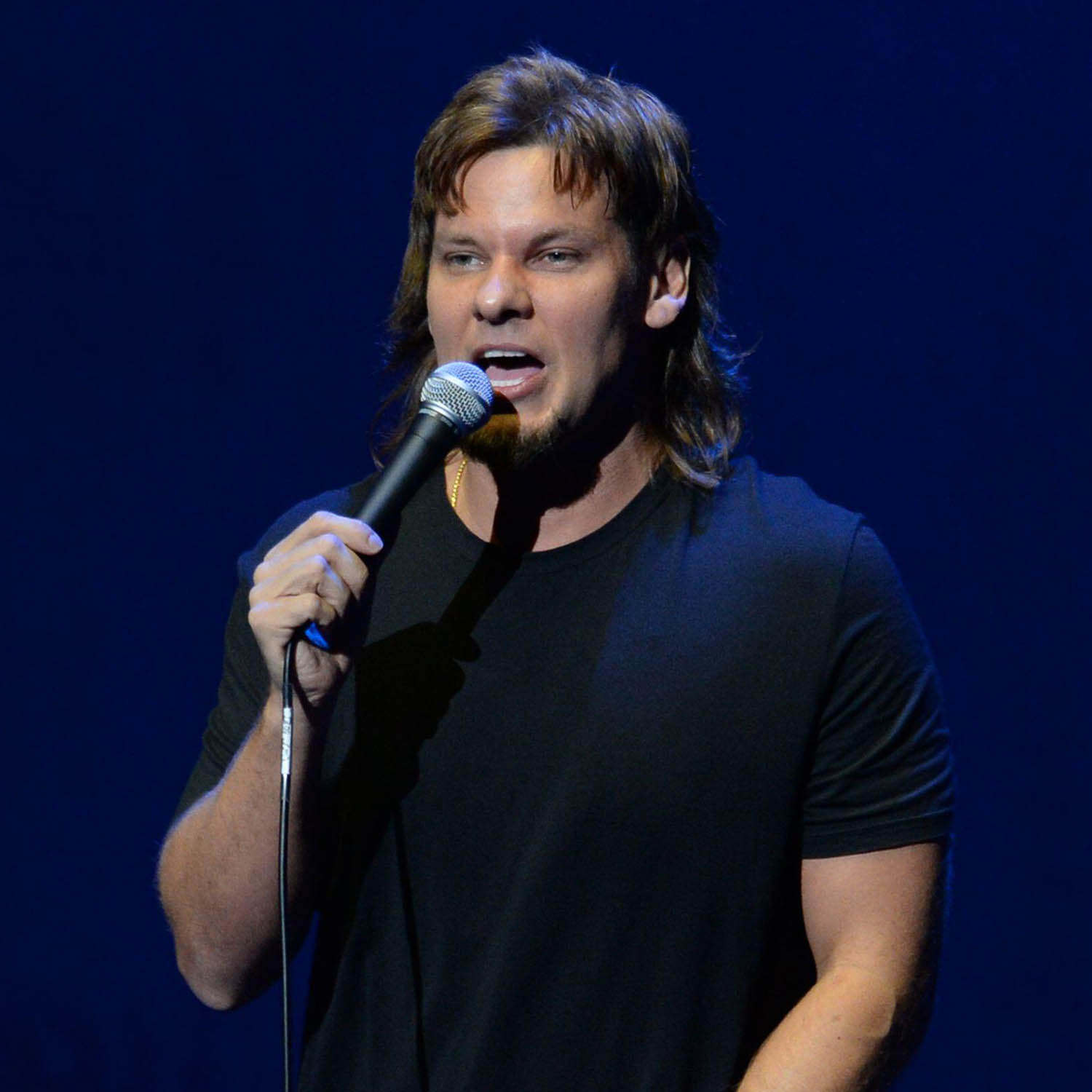
Theo Von’s podcast episode with Donald Trump got 17 million YouTube views
The failure of journalism has been key to the trust between podcasters such as Smith and Rogan and their audience. (Explainer: Everything you need to know about journalism’s decay! The internet! Less money! Less reporting! Omission! Inaccuracy! Bias! What about those WMDs?!). People stopped trusting us.
“They’ve been lied to time and time and time again,” said Francis Foster, co-host of the Triggernometry podcast and repeat guest on Rogan. “And they feel that their trust has been betrayed. They’re quite right to feel their trust has been betrayed. And so they turn to people like Joe Rogan because they believe that Joe is more authentic.”
Podcasts are part of legacy media’s replacement. The biggest in the world is the The Joe Rogan Experience (JRE), recorded in Austin. For years, I didn’t listen to it. Even when comedians I liked were guests, I preferred WTF with Marc Maron. Rogan was too long, the laughs too few. Then I was in New York for last year’s US presidential election.
In the fortnight around the election, Rogan’s guests included Trump, JD Vance and Elon Musk, as well as comedians Tim Dillon, Theo Von and Smith, who went on the first episode recorded after the election. Having politicians on podcasts wasn’t new. Maron had Barack Obama on WTF in 2015. But Rogan was different.
The big podcast that Kamala Harris went on during her campaign was Call Her Daddy, hosted by Alex Cooper and described on her YouTube channel as “the most listened-to podcast by women”. The episode lasted 46 minutes. When people record an episode of JRE, past guests will text them afterwards: “How long did you get?” If they did two hours, the assumption is Joe wasn’t keen. If they did three, that’s good. Trump did three hours.
“This is the new standard,” Smith said to former Fox News host Tucker Carlson in May. “To be a presidential candidate, you have to be able to do a three-hour podcast. And, actually, probably several of them.” Rogan doesn’t grill guests, but you can’t hide for three hours. The host said he wanted to have Harris on but she would only do an hour and not in Austin.
“Rogan’s audience was young and male,” Harris writes in her new book about losing the election, 107 Days. “I wanted to reach those guys who might not otherwise hear from me.” She said she offered to do it in Austin on 25 October, but Rogan was busy. (It transpired he was interviewing Trump that day.) She declined other dates and times, and Rogan turned down an hour in Washington DC.
The result was that Trump got 60 million views on YouTube. He got 17 million more views doing Von’s podcast. Vance did Von, whose reward was a seat at Trump’s inauguration. Vance also went on Dillon’s podcast. And Tony Hinchcliffe, who hosts a show at Rogan’s club, spoke at Trump’s rally at Madison Square Garden. The comedians stepped up.
If I sound like I’m tutting, I should be honest: when I woke up in New York on 6 November 2024 and turned on the news, and I saw in the faces of the presenters that they knew everything had changed, I felt relief. The big “fuck off” button, as documentary-maker Adam Curtis called it, had been pressed. If alarm bells are ringing, they should be.
“We’ve moved into this weird fucking hemisphere where these comedians are in suits at a presidential inauguration. It’s fucking nuts. It doesn’t make any sense”
Comedian Joe List on his podcast Tuesdays with Stories!, 2025
Have you ever gone to an event alone, and you sit with someone else alone, but you hesitate to risk conversation in case they’re more boring than you are? I did that, but it turned out the person next to me had recently been falsely blamed for the deaths of 67 people. In January, a passenger jet collided with a US army Black Hawk helicopter in Washington DC. Everyone died. Trump implied a “diversity push” in air traffic control was to blame and when a reporter asked why he implied that, Trump said: “Because I have common sense.”
The army withheld the pilot’s name, so the internet’s top investigators got to work. Two days before the crash, Trump signed an executive order banning trans people from the military. A post wondered if it might have been “another trans terror attack”.
Jo Ellis had joined the national guard as a man in 2009, was deployed in Iraq, qualified as a Black Hawk pilot, began taking hormones in 2023, and in 2024 started presenting publicly as a woman, so people posted her name and photo in relation to the crash. Three days after the crash, the army named the dead pilot, whose family asked for privacy. “We are devastated,” they said. The pilot was not trans. Ellis is now on compulsory leave from her part-time military job because she is trans.
On my third night at the Comedy Mothership, I watched the show with Ellis. Her story’s been reported widely, but she “couldn’t find an outlet that would tell my story that had the audience that Rogan has – the types of people that vote for the president”. So she’s trying to be a comedian: “What if I went down there and did the Mothership as far as open mic, and maybe Kill Tony? Maybe that’ll catch enough people’s attention to where I could land an invite to Rogan’s podcast and just tell the story?”
She did Kill Tony, one of the biggest podcasts in the world (it has been on Netflix and sold out Madison Square Garden), on which she did a minute of standup material and told her story to host Hinchcliffe. The episode’s been viewed 2.3 million times on YouTube. Now she wants to do Rogan. “Comedy has so much political weight right now,” she said.
She’s not wrong. On Howie Mandel’s podcast in August, Maron said comedians “were spearheading” Trump’s “anti-woke” policies “whether they knew it or not” and it had cost “a tremendous amount of democratic-leaning ideas and movements”. When Mandel questioned whether comedians had that much power, Maron said: “Are you fucking out of your mind?”
Trump knew they had power. Nick Marx, a professor at Colorado State University and co-author of That’s Not Funny: How the Right Makes Comedy Work for Them, said: “I think the October 2024 podcast tour that President Trump did with Theo Von, Andrew Schulz, Joe Rogan and others directly motivated young men to turn out for Donald Trump.
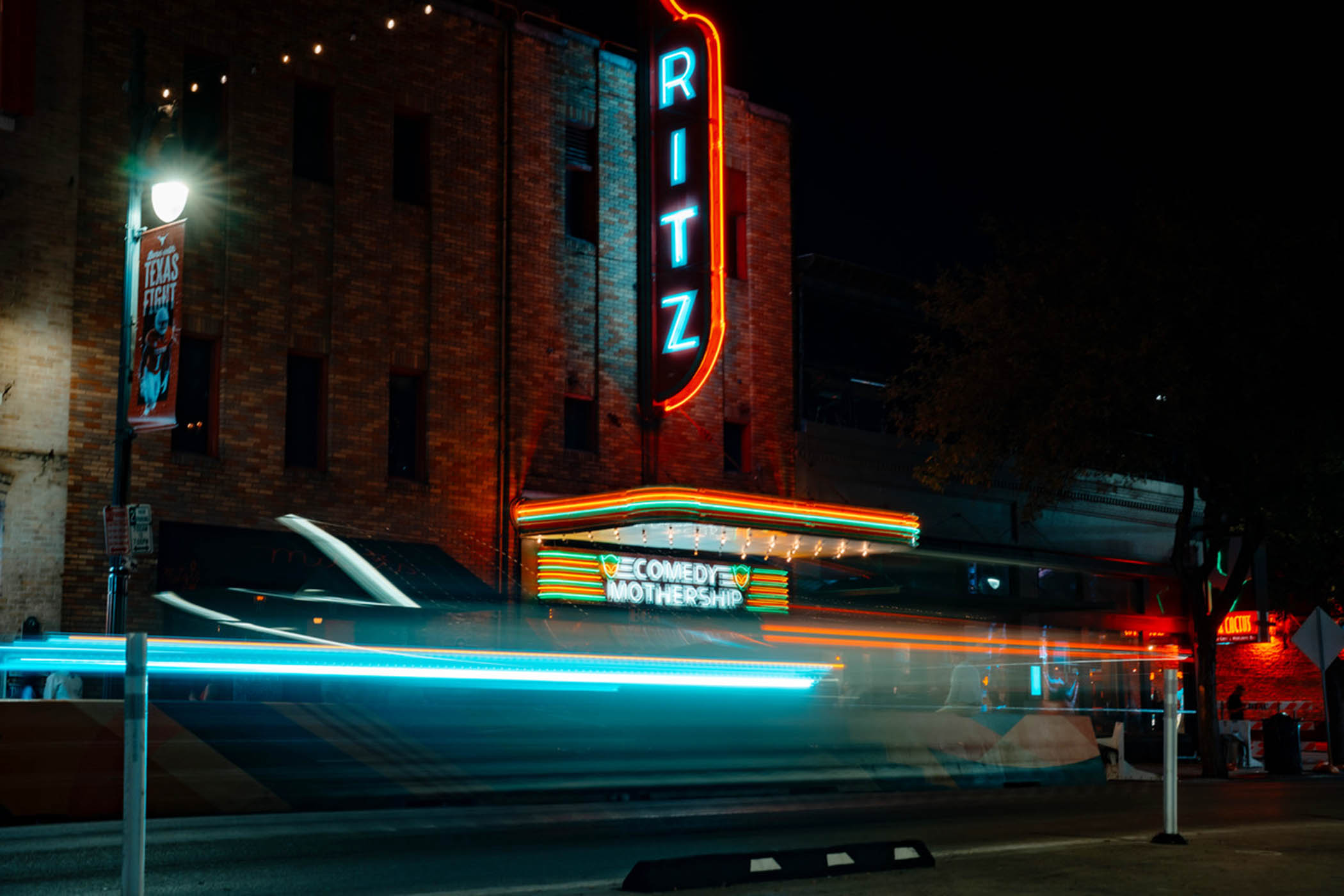
The Comedy Mothership is situated in an old theatre
“I’m not a political scientist, I don’t have empirical data to prove that, but it’s clear that his campaign saw that group as up for grabs. He and his advisers understood that this is a group of voters who either had not yet voted – this was their first election – or they were somewhat ideologically ambivalent and could be persuaded.
“And he understood that this is the new gathering place for them, the manosphere, right, the sort of rightwing comedy podcast universe. And I think those of us on the left have been pretty slow to recognise that this is where the energy and the sort of attention, cultural attention has been drifting for young men.”
Trump and Vance embraced them; their opponents did not. Richard Reeves, president of the American Institute for Boys and Men, said in the Guardian: “The Republicans put out a welcome mat there for men and said: ‘We can see you, we’re cool with you being guys, we like guys; the Democrats hate you, they think you’re the problem.’ Absent a proper Democrat response to that, I think Harris just ceded the ground.”
It was rational for men to feel hated. Mansplaining. Manspreading. Small-dick energy. “There’s too much toxicity, masculine toxicity out there,” Harris’s husband, Doug Emhoff, said in 2023. Harris didn’t seem hostile to men, but she never corrected the feeling her party was. It was the same in the UK. “[Keir] Starmer ‘worried’ about toxic masculinity,” the BBC said in a news headline this year. Pale, male and stale. Believe all women. The masculinity crisis.
A lot of men went quiet in recent years, but not all men. Some never ceded the floor. Did not repent. I don’t mean Andrew Tate. I mean people such as Rogan, who kept talking, mainly to men about things men wanted to hear about. As their popularity grew, some mocked them, some feared them, but their audience loved them.
“We love you, Dave,” shouted a woman in the Mothership. I’d assumed everyone at Smith’s shows would look like me: “Ugly, fat, bearded men, 37 to 45,” is how Skanks co-host Luis J Gomez described their fans. But there were lots of women. Outside the club, I asked Gail and Emmy if they were Trump supporters. “I’m not, but she is severely,” said Emmy. Gail, in her 60s, told me she listens to Rogan: “I listen to JRE,” she said. “I listen to a serial killer podcast, a guy from Norway that does it. I watch Part of the Problem on YouTube.” A survey by Edison Research found that, in the final quarter of 2024, US women over 18 listened to Rogan more than any other show.
Emmy voted for Harris, but still laughed at Smith’s joke that 100% of women who’ve run for president have been beaten by Trump. “Ladies, you have to stop running for president,” he said. I asked Gail if she still supports Trump. “I’m like Dave Smith,” she said. “I voted for him because I thought it was the better choice. But now…”
The next day in a pub, Mitch, a local, asked why I was in town. I told him I was writing about the power of comedians. “Those comedians have a lot of pull,” he said. “You know why? We trust them more than mainstream people and politicians. And they’re entertaining.”
“I think if Hitler were alive today he’d probably appear on Theo Von’s podcast. And Theo would be like, ‘See, y’all did a lot of meth, right? ... That shit will make you crazy, dog. I did some meth once. I was up for three days and then I ate a live bird ... Hey Hitler, you probably didn’t even hate the Jews. That was just the meth making you crazy, dog. Hey Hitler, do you want to apologise to all the Jews right now on my show? No? I get it.’”
Marc Maron, Panicked, 2025
I couldn’t have picked a worse week to out myself as a Legion of Skanks listener. The day I flew back from Austin, a photo was posted on X of Smith with Jake Shields, a former mixed martial arts fighter. Shields has more than 880,000 followers on X and does not like Jews. Nor do a lot of his fans. One fan replied to Shields’s photo: “Getting comfy with the enemy. Fuck that.”
Shields responded to the criticism: “People are angry I’m with Dave Smith because he’s a Jew. Dave and [I] have a few differences in beliefs (Hitler) but Dave has fought harder than almost anyone for the people of Palestine. Jews hate Dave with a passion for being a ‘race traitor’. Why attack a man on our side?”
Smith talked about the photo on his podcast: “I’m not a leftist. I don’t agree with all of you that bigotry is at the top of the hierarchy of outrages. That doesn’t mean I like it, but I’m friends with people who have political views I disagree with. I’m even friends with some people who support what Israel’s doing to Gaza right now, and I actually think that’s a much worse opinion to have than to hate blacks or hate Jews or hate anyone, to actively support people being blown up.”
The photo happened because Smith invited Shields on Legion of Skanks in New York the day after he got back from Austin. Anthony Cumia, once of Opie & Anthony, was also a guest. Cumia was fired from O&A in 2014 for what broadcaster SiriusXM called “racially-charged and hate-filled remarks” on what was then Twitter. Last year he tweeted: “Blacks have predisposition for violence and murder. They can’t function in a civil society.”
The episode was uncomfortable. On the next Skanks podcast, co-host Big Jay Oakerson said: “Can I publicly denounce Jake Shields and all of his stupidity? That guy was my least favourite guest we’ve ever had.” Smith conceded: “It didn’t work.” Oakerson said his defence of the show is usually: “We’re kidding,” but it didn’t seem like Shields was kidding, which was “polluting” what they do. They agreed not to have him back.
A public discussion of what went wrong and what they’ll do differently; it was a decent blueprint for how all media and podcasts could be transparent with the audience. They also talked about Cumia, whose tweets they criticised – “I think Anthony Cumia’s persona sucks online and I love Ant,” said Gomez – but they agreed he’s funny on the show. He would be back.

Marc Maron interviewed Barack Obama in 2015
Choice of guests was one of Douglas Murray’s criticisms of Rogan: “I feel you’ve opened the door to quite a lot of people who’ve now got a big platform who have been throwing out counterhistorical stuff of a very dangerous kind.”
Murray cited Ian Carroll, who later tweeted that Israel murdered Charlie Kirk. The tweet has been seen 11.5m times. Before that tweet, Rogan told Murray: “I brought him on because I want to find out, how does one get involved in the whole conspiracy theory business?”
In general, I want to hear people – my preference is openness. While in Austin I listened to Francis Foster and his Triggernometry co-host Konstantin Kisin interview Benjamin Netanyahu and Tommy Robinson. Both were scrutinised. But a line from Robinson’s book, Enemy of the State, always gives me pause: “I hadn’t been doing TV interviews or putting myself out there, but what quickly became clear was that once I did, support for the English Defence League rocketed.”
Putting someone on a platform usually helps them. Rogan knows that. In 2022, he told Lex Fridman, also an Austin podcaster: “I’m not a Trump supporter in any way, shape or form. I’ve had the opportunity to have him on my show more than once. I’ve said no every time. I don’t want to help him.”
But Carroll was helped, his conspiracy theories were amplified.
Rogan’s also been criticised for misinformation, particularly episodes during the Covid pandemic, when his audience grew by millions. After an episode in 2022 featuring virologist Robert Malone, Rogan responded to criticism in an Instagram video: “I get things wrong, but I try to correct them because I’m interested in telling the truth.” To me, with my mediocre brain (at best), the tone and format of his show signal conversation not examination; speculation not information; I never assume accuracy.
But when I filed this piece, it came back with a note: “This extrapolation seems too easy.” So I did more reading, including a New York Times article about that 2022 episode: “Fact-checking Joe Rogan’s interview with Robert Malone that caused an uproar.” The article was corrected the day after publication. And again five days later. Maybe Rogan’s corrections should be equally comprehensive and specific. We all make mistakes.
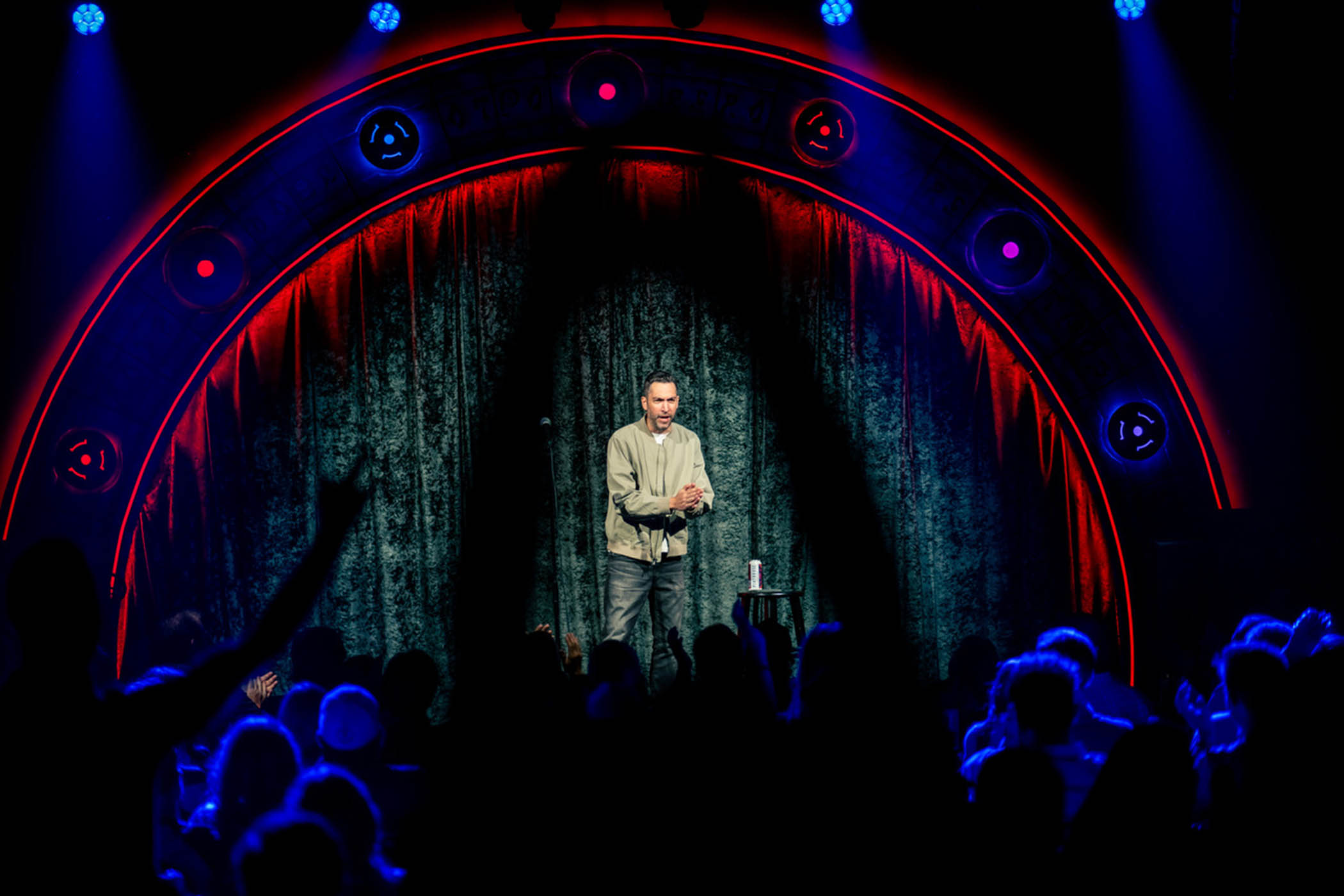
Joe Rogan’s Comedy Mothership in Austin, Texas, seats 250 people
In 2024, Rogan changed his mind on Trump. He had him as a guest and endorsed him (having endorsed Bernie Sanders in 2020). Now, the war in Ukraine continues, as does the one in Gaza; people have been killed on boats with no chance to defend themselves in court; masked men snatch people off the streets; people have been locked up for protest. “I supported him last year,” Smith said on the Breaking Points podcast in June when the US was preparing to bomb Iran. “I apologise for doing so. It was a bad calculation.”
In June, Rogan said: “The Trump administration, if [they’d] said we’re going to go to Home Depot and we’re going to arrest all the people at Home Depot, we’re going to go to construction sites and we’re going to just tackle people at construction sites, I don’t think anybody would have signed up for that.”
Last month, the Department of Homeland Security (DHS) posted a video of Von saying: “Heard you got deported, dude – bye”. Von tweeted that he had not approved it and asked the DHS to take it down. “When it comes to immigration, my thoughts and heart are more nuanced than this video allows. Bye!” The DHS took it down. After a bad show days later, Von told fans: “I’m having a long month, I’m trying not to take my own life.” He didn’t seem to be joking.
In July, Marc Maron said on the Good One podcast:” “Whether you like it or not, or whether that’s not what you signed up for, you tied yourself to that horse.” The comedians are trying to untether themselves, but it’s not clear who, if anyone, they’ll support instead. On Carlson’s podcast in May, Smith said he hopes Vance wins in 2028.
In the months since, the free speech tide has become less certain, with the US attorney general talking about prosecuting “hate speech”, and Vance telling people to snitch to employers if anyone celebrates the murder of his friend Kirk. Maybe comedians learned a lesson from Trump. Maybe not. Their instinct is more conversation, not less, so perhaps Vance will do the rounds again. I expect he’ll struggle to book a comedian for his campaign rallies.
One thing is sure, though: over the next few years, a lot of people such as myself – people who sincerely value free speech, who have tuned out of television news, who resent being called toxic – will be looking for someone to represent their interests in the UK and US. If a politician wants to beat Vance in the US, or likely beat Nigel Farage in the UK, they know where to reach us: just email Joe Rogan’s booker.
Newsletters
Choose the newsletters you want to receive
View more
For information about how The Observer protects your data, read our Privacy Policy
Photographs by Troy Conrad/Comedy Mothership, Alamy, Getty Images, Jeff Bottari/Zuffa LLC
